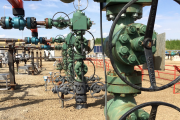Recent analysis has done Canadians a favour by debunking oil industry claims that regulating methane emissions will destroy our competitive edge. While Donald Trump proposes cancelling federal methane regulations in the U.S., industry groups in Canada argue we must eliminate regulations here too if we are to have any hope of competing with U.S. counterparts. This week, Greenpeace shared research completed by Environmental Defense Fund that shows there is little factual basis to those claims.
Despite President Trump’s plans to eliminate federal methane regulations for new sources in the U.S., this action — which will not happen overnight due to a legal system that strongly protects existing laws — will not affect state-level oil and gas emission regulations. California, Colorado, Ohio, Pennsylvania, Wyoming and Utah’s methane emission regulations already apply to 25% more oil and gas production than the proposed Canadian rules would to Canadian production. Our regulations lag behind the U.S. regulatory landscape. Just yesterday, the State of Ohio, which has a Republican Governor and Republican controlled Senate and House issued new standards for quarterly leak detection for compressors, which is more rigorous than what Ottawa is proposing. So with these regulations now lagging behind our southern neighbours, the question isn’t, “can we afford to lead?” but, “how did we fall behind?”
Now is the time to implement Canada’s commitment to reduce oil and gas methane emissions — not to give into the baseless idea that Canadian operations will be uncompetitive. Our oil and gas industry is an innovative sector that will use the three years before Canada’s regulations kick in to find solutions that will transform the way the industry operates. We know that reducing oil and gas methane is one of our country’s best and most cost-effective ways to reduce greenhouse gas emissions. Let’s make sure Alberta and Canada don’t get left behind by oil-producing states south of the border and the rest of the world. They won’t make the mistake of skipping methane emission reductions as a key part of their climate plans.








